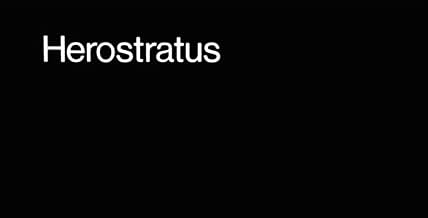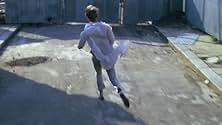Ajouter une intrigue dans votre langueWhen young poet Max (Michael Gothard) hires a marketing company to turn his suicide-by-jumping into a mass-media spectacle, he finds that his subversive intentions are quickly diluted into a... Tout lireWhen young poet Max (Michael Gothard) hires a marketing company to turn his suicide-by-jumping into a mass-media spectacle, he finds that his subversive intentions are quickly diluted into a reactionary gesture, and his motivations are revealed as a desperate attempt to seek atte... Tout lireWhen young poet Max (Michael Gothard) hires a marketing company to turn his suicide-by-jumping into a mass-media spectacle, he finds that his subversive intentions are quickly diluted into a reactionary gesture, and his motivations are revealed as a desperate attempt to seek attention through celebrity.
- Réalisation
- Scénario
- Casting principal
Avis à la une
A film by Don Levy (1967)
Herostratus is the first feature film by Don Levy whose short films have been distinguished by their original technique and penetrating approach to their subject.
Herostratus is in the same tradition. The story, on the surface, seems simple. A young man wants to commit suicide publicly and in the presence of as many people as possible. He persuades a public relations firm to exploit the event then he changes his mind but by this time other forces are active and he is no longer in control of the situation.
Levy exposes his characters and their motives layer by layer. He does so in the context of a society whose aims and aspirations are centered on private gain and personal success, virtually at any price; in this society the idealism and humanism which can unify a country after a war are rapidly displaced by destructive self-interest. It is not enough, in Levy's view, to say that war is hell. One must go deeper, find the causes, and attack them.
Herostratus, essentially a film d'auteur, is technically dazzling, but never in a gratuitous or bravura sense. Levy alternates "one-take" scenes (designed to gain the greatest response from the actors, who improvised their dialogue) with short scenes and "threshold" sequences making, in Levy's words, an intricate network of emotional references.
Herostratus takes its title from the legendary figure who burnt down the temple of Artemis in Ephesus, one of the Seven Wonders of the World, in a bid to gain immortality by some great feat of destruction in the manner of the conquerors. On the same night Alexander the Great was born.
From the brochure of the 2nd Annual Los Angeles FILMEX (1972), written by Richard Whitehall:
A British masterpiece of underground cinema seems almost a contradiction in terms, yet Don Levy, with his first feature, has broken through those literary traditions on which the British cinema has been so firmly founded. Under the greatest of difficulties (more than six years from conception to completion), and a minimal budget ($25,000) Levy has produced a dazzling film d'auteur quite unlike any other film ever made. Long takes, through which the actors improvise brilliantly, alternate with clusters of staccato, sometimes subliminal imagery as Levy explores the ramifications and resonances of his theme: the revolt of a young failed poet against the horrors and corruptions of society, and the means he takes to make his protest known.
This theme becomes a visual mosaic of emotional cross-references, combining an apparent linear form, in which sequences seem to follow a chronological order, with an abstract and metaphoric visual structure in which the magnificently composed and edited images are placed in emotional and intellectual juxtaposition and conflict. Levy, filmmaker, painter, scientist, and now on the faculty of California Institute of the Arts, has produced one of that handful of films which has changed the contemporary conceptions of narrative cinema.
Distribution problems may have kept Herostratus from general audiences, but its impact on filmmakers, especially in western Europe, has been profound. Its influence may be seen not only in the revitalized German cinema of "Junge Deutscher Film" but also in Kubrick's A Clockwork Orange.
Like others who have written here about HEROSTRATUS, I too saw this amazing and unforgettable film in the early 70's. I have subsequently longed to see it again.
This film is what I like to call "transformative" cinema. Tranformative in the way the films of Bergman, Pasolini, Godard & DaSica can be. You may detest this film. But, you will not easily forget it.
I'd also like to say that if you like the novels of J.G.Ballard, particularly the books of the 70's, you will probably appreciate this film. I've always considered it particularly "Ballardian". This film grabs corporate capitalism by the throat. Yes, it is cynical.
I am happy to report that Herostratus is now available on DVD. It can be obtained at Amazon UK.
I have never been more moved by a film. I can compare it only to such transforming experiences as seeing L'Avventura in the early 'sixties, although the art of Herostratus is far more mysterious. The mystery is compounded by the great gulf of years that separates me from that screening, by the fact that almost nobody I meet has seen it or even heard of it, and by the apparent lack of any body of explication and commentary.
Without seeing it again I wouldn't attempt a precis of the plot, but what remains in memory is the cool classicism of the narrative(innocence vs. worldliness and levels of manipulativeness that Henry James might have appreciated) as mediated through an unobtrusive but arresting surrealism of technique.
It's been 35 years--I'd really like to revisit Herostratus.
This British underground film was unseen for close to forty years before it was resurrected by the BFI. It is a very odd film indeed, pretty much fully an avant-garde piece. The story-line is essentially quite basic and not a huge amount of plot really happens, which for a 142min film is unusual. For me, by far the most interesting thing about this one was its visual ideas. It's a film which is relentlessly experimental in approach with elements of surrealism. The memorable visuals are often achieved by way of very bold editing techniques used throughout, where contrasting images are juxtaposed with each other. There is recurring imagery used extensively, including a mysterious black clad woman wandering the backstreets of London, an exotic dancer interspersed with images from a slaughterhouse, old newsreels and many billboard advertisements. There is a hell of a lot more than this as well but this is a film which throws a lot at you and it can be hard recalling precisely everything that occurs. There is a mixture between very long single takes and fast edits, the former are used for dramatic intensity. Michael Gothard is the lead here and he is an actor associated with intense performances, so he is a good fit it has to be said. The film overall is certainly a fascinating watch but it is slow in places and there are patches where it does get a bit tedious. The narrative was semi-interesting but the visual invention is really what it's worth seeing for and it is for sure a film that should be seen by those drawn towards experimental cinema. Look out too for an appearance of a very young Helen Mirren.
Le saviez-vous
- AnecdotesHelen Mirren's debut.
- ConnexionsEdited from Les camps de concentration (1945)
Meilleurs choix
- How long is Herostratus?Alimenté par Alexa
Détails
- Durée
- 2h 22min(142 min)
- Couleur
- Mixage












